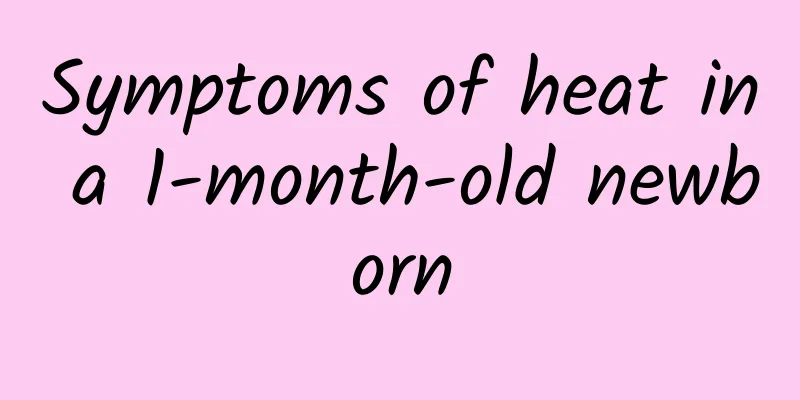Symptoms of heat in a 1-month-old newborn

|
The body of a one-month-old newborn is still relatively delicate and its physical condition is relatively poor. If it is not properly cared for or has a poor diet, it will show various symptoms when it gets hot. For example, the child will have dry stools, yellow urine, more eye mucus, crying, and sometimes mouth sores and other symptoms. At this time, parents must strengthen the conditioning of their children in a timely manner. Symptoms of heat in a 1-month-old newborn 1. Dry stool Symptoms: Dry and hard stools, small amounts of hard, granular stools, and bowel movements occur every 3-5 days. The defecation process is prolonged or difficult, and the baby cries and makes a fuss due to pain in the anus caused by irritation from dry feces. Hazards: Babies suffering from constipation often form a vicious cycle. Constipation will reduce immunity and make the baby vulnerable to external viruses. Long-term poor bowel movements can cause habitual constipation. 2. Yellow urine Symptoms: Your baby's urine is yellower than usual and less in volume. Hazards: Long-term short and yellow urine means that the baby's body is often dehydrated, and normal physiological activities and physical development will inevitably be affected. 3. Mouth and tongue ulcers Symptoms: Babies who cannot speak often refuse to eat, are easily irritated, cry and even refuse to drink water. Some babies will touch their mouths with their hands from time to time. Harm: Mouth and tongue ulcers can cause babies to refuse to eat, become irritable, and even unwilling to drink water, resulting in insufficient normal nutrition for the baby and affecting physical development. If you are not careful, it is easy to cause angular cheilitis, also known as "sore corners of the mouth." 4. Poor sleep Symptoms: Babies often become irritable, restless, cry, wake up easily, turn over and over, and sometimes grind their teeth while sleeping. Harm: Poor sleep leads to a disrupted daily routine, and makes the baby prone to anger, mental irritability, impatience, mood swings, etc., which further aggravates the baby's problem of getting angry. This will eventually lead to consequences such as poor development and decreased resistance, affecting the baby's normal physical and mental development. 5. Increased eye mucus Symptoms: Some babies will experience increased eye secretions, especially in the morning when they wake up, there will be eye mucus in the corners of the eyes, and if there is too much, it will stick to the eyelids. Hazard: It is easy to cause bacteria invasion and cause sty. Stye, commonly known as pinhole, is a common eye disease in babies. 6. Have a bad breath Symptoms: Bad breath is not an independent disease, but a warning signal sent by the body. Hazards: Bad breath will affect your daily life experience, and when stomach fire is severe, problems such as dry stools will occur simultaneously, forming a vicious cycle of getting angry. |
<<: Symptoms of postpartum endocrine disorders
Recommend
What are the effects and functions of the traditional Chinese medicine Cnidium monnieri
Cnidium monnieri is a herbaceous plant, which is ...
Which acupoints should be moxibustioned for frozen shoulder? The moxibustion sites are different at different times.
Moxibustion can effectively relieve the symptoms ...
What to do if you sprain your waist
Some people don't pay attention in life, or w...
What is hemiplegia? What are the types of hemiplegia?
Many elderly people are likely to suffer from hem...
Do you know the symptoms of chickenpox in adults?
Chickenpox not only affects children, but adults ...
Is it painful to recover from lumbar nerve injury?
The human body has nerves distributed all over th...
Can lupus nephritis be cured?
You may not have heard of lupus nephritis in your...
Can Chinese medicine promote ovulation?
Many women have poor ovulation or no ovulation. T...
How to treat uterine cysts, safe and effective dietary therapy
Uterine cyst is a common uterine disease in women...
What does a negative antinuclear antibody mean?
A negative antinuclear antibody test result indic...
What to do if you have kidney stones and hematuria? Chinese and Western medicine have good treatments
Kidney stones refer to stones that occur at the c...
What diseases can be seen by looking at the tongue in traditional Chinese medicine
There are certain rules for Chinese medicine trea...
How many pills should I take at one time?
How to take Ren Dan? It is very easy to get heats...
Things to note about bone hyperplasia
Most young people today live with their grandpare...
Is there a hard bean in the labia minora?
Women's private parts must be maintained and ...









